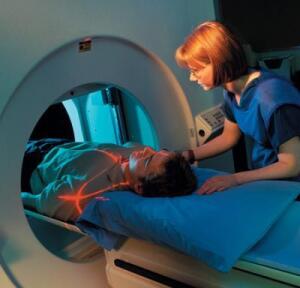por
Brendon Nafziger, DOTmed News Associate Editor | August 27, 2012
The U.S. Department of Veterans Affairs said it would embark on a "phased implementation" of CT lung cancer screening for veterans after taking inspiration from a national trial that found the scans could help save lives among certain high-risk populations, DOTmed News has learned.
In an official statement sent to DOTmed News, the department said the program would begin at six yet-to-be-named VA hospitals as a clinical demonstration project.
A department spokeswoman said she could not give a start date for the project as it's still under development.
The VA said the program was inspired by the National Lung Screening Trial, a
landmark national screening trial that ended last year and found that after three rounds of screening, high-risk patients -- in this case, current or former heavy smokers -- were 20 percent less likely to die if they were screened with lung CT scans rather than simple chest X-rays.
The department said it would use feedback from the first veterans to participate in its screening program to determine how to roll-out the program over the rest of the VA's system.
"The experience of veterans who undergo screening will be closely monitored to gather information about outcomes from the screening and follow-up," the VA said in its e-mailed statement. "Patients also will be asked about their experience with the process to help VHA understand the potential harms of screening, such as anxiety, fear, inconvenience and pain."
The Lung Cancer Alliance, a nonprofit, first broke the news that the VA would start lung cancer CT screening earlier this month, saying the department told them in a letter after the LCA had pushed for the VA to offer CT screenings to veterans.
Lung cancer is the leading cause of cancer deaths in the United States, with around 160,000 people succumbing to it every year, according to the American Cancer Society. Veterans are at increased risk for lung cancer, partly because of high rates of smoking and exposure to battlefield hazards, according to the LCA.
In May,
several major medical groups, including the American College of Chest Physicians and the American Society of Clinical Oncology, endorsed CT lung cancer screening for patients 55 to 74 who have smoked a pack a day for 30 years, or the equivalent, and either still smoke or quit relatively recently. However, the groups stipulated that the screenings should only be offered by facilities that can provide coordinated, comprehensive care for screening and treatment.
The American Lung Association tentatively supports similar screening recommendations, although the group urges patients to discuss the issue with their doctors, according to an April report the ALA prepared on the subject.
Still, lung cancer CT screening is not without controversy, amid worries about the risks of ionizing radiation from the scans and patients getting false positives. According to a Journal of the American Medical Association paper written by researchers affiliated with the ACP, ASCO and the NCCN, studies suggest that of the 20 percent of patients who test positive for cancer after a CT lung screening, only 1 percent actually has the disease. This means screening could lead to many cancer-free patients experiencing anxiety and undergoing surgical biopsies, which carry risks of their own.
The ALA also said the scans, which are often not covered by health plans, typically cost between $300 and $500.
